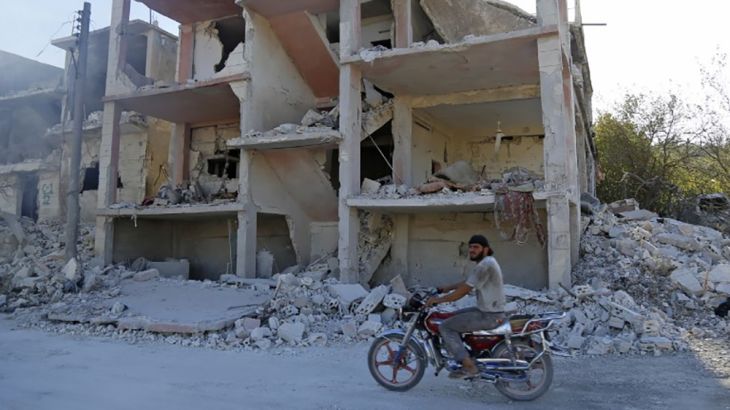Putin, Rouhani, Erdogan to discuss Syria’s future in Tehran
Iran, Turkey and Russia meet in new diplomatic efforts as Syria plans offensive in rebel-held Idlib.

Tehran, Iran – The presidents of Iran, Russia and Turkey have met in Tehran to talk about how to shape the future of a country torn apart by years of civil war amid a possible military offensive to retake the last rebel-held bastion of Idlib.
At Friday’s summit, Hassan Rouhani, Vladimir Putin and Recep Tayyip Erdogan were expected to sign an agreement about ongoing military cooperation in Syria, the right of return for refugees displaced by the conflict, and the creation of a committee to investigate the fates of people arrested by the government or who went missing during the conflict, according to Iran’s foreign ministry.
Keep reading
list of 4 itemsAslan, a little Syrian boy’s journey to hear again
The hostility Syrian refugees contend with in Lebanon
Sweden launches war crimes trial against former Syrian officer
In its eighth year, Syria’s civil war has seen more than half a million Syrians dead and 11 million – more than half the country’s population – either internally displaced or living as refugees in Lebanon, Jordan, Turkey and Europe.
While Syrian President Bashar al-Assad has the military advantage, he now presides over a country where large areas more closely resemble fields of rubble than cities or towns.
|
|
On Monday, just days before the trilateral summit in Tehran, Iranian Foreign Minister Mohammad Javad Zarif made a surprise visit to Damascus where he looked ahead to reconstruction.
“Reconstruction of Syria and Iraq is a good opportunity for the presence of Iranian companies,” said Zarif.
“God willing, we will have talks with the three members of the Astana process on Friday to prevent any harm to the Syrian people and pave the way for the process of purging extremists.”
But even though world leaders are talking about returning refugees and reconstruction, Syrian lives are still at risk.
The United Nations High Commissioner for Refugees Filippo Grandi appealed to Iranian leaders to prevent more bloodshed in the Syrian conflict.
“It is clear that the risks of a military confrontation causing massive loss of life is very high and I told Zarif that my appeal, just like the UN Secretary-General and others, is for them to minimise the loss of life,” Grandi told Al Jazeera.
“I also pointed out that the government of Syria wants people to go back. Other governments, like Russia, want people to go back. The refugees are watching how the war will continue.”
Grandi added that world leaders were not doing enough to stop the conflicts that result in large refugee crises and that the circumstances for civilians displaced by war were getting worse every year.
While he commended Iran’s long-continuing help for Afghan refugees, he said leaders in Tehran are also in a position to speak for the rights of Syrian refugees.
“Iran already shoulders a very heavy responsibility with Afghan and some Iraqi refugees on its own territory and I think it would be unfair to ask Iran to do more,” said Grandi.
“But certainly, we’re asking Iran to add its voice to those that request more support for Syrian refugees, for Rohingya refugees in Bangladesh to ask for more support and to ask for solutions to those conflicts that determine the flight of these populations.”
|
|